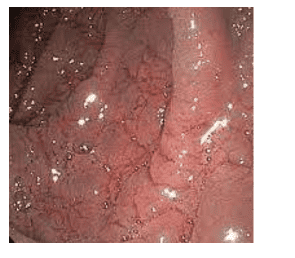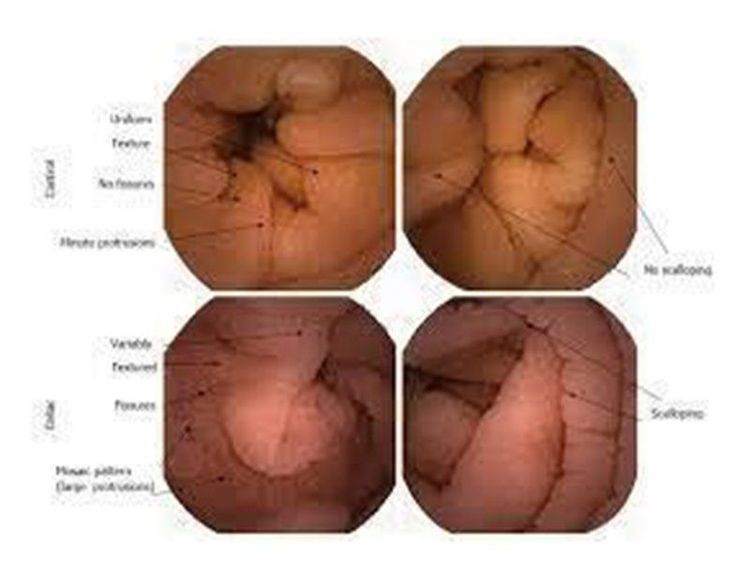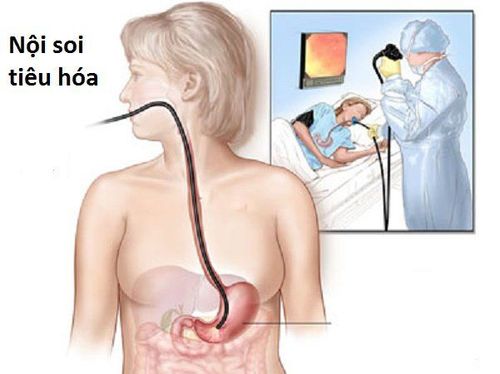This is an automatically translated article.
Posted by Master, Doctor Mai Vien Phuong - Department of Examination & Internal Medicine - Vinmec Central Park International General Hospital
1. Endoscopy of the stomach - duodenum
With the development of endoscopic techniques, more and more endoscopic images suggestive of Celiac disease have been recorded, thereby helping the endoscopic surgeon to conduct biopsies more easily. Typical endoscopic images of the descending duodenum after inflation include: decreased number of folds of the duodenal mucosa (Kerckring's fold), rough duodenal mucosa, visible meshwork submucosal vessels (mucosal atrophy), may show deep grooves, fissures, examination, papules, or lithographic images.
Although the sensitivity of these features is low, not all patients have them, but seeing these findings suggests the endoscopist to perform a biopsy. Staining such as methylene blue or indigo carmine can be used to visualize changes in the mucosal surface more clearly, especially atrophy of the intestinal villi and the vascular network. Magnified endoscopic technologies also allow increased sensitivity in detecting villi in the duodenal mucosa to over 90%. However, the research results show that the use of endoscopic imaging to diagnose Celiac disease at different centers has not been unified, so so far it cannot replace the results of duodenal biopsy.

2. Colonoscopy
Colonoscopy biopsy in patients with persistent diarrhea, even when multiple symptoms point to Celiac, help rule out lymphocytic infiltrative colitis or gastritis. The endoscopist may also insert the endoscope into the terminal ileum to look for lesions and biopsies to rule out Crohn's.
3. Capsule endoscopy
This is a commonly used technique to detect small bowel lesions in many different diseases including Celiac. Features noted on capsule endoscopy in Celiac include mucosal atrophy, flattened mucosal folds, and striated intestinal mucosa, possibly mosaic
.

4. Which patients should be screened for celiac disease?
There are currently no specific guidelines in which patients with clinical symptoms, laboratory abnormalities, or special medical history should be screened for Celiac. The detection rate of this pathology was slightly increased in the group of patients with irritable bowel syndrome and was significantly higher in the group of patients with iron-deficiency anemia of unknown reason. Therefore, in some patients who are considered high-risk subjects, even though there are no typical symptoms of the disease, they still need to be screened, including:
Family history of parents, siblings with the disease Celiac Anemia, especially iron deficiency anemia, bone metabolic diseases Type 1 diabetes, especially in children Autoimmune endocrine diseases, especially thyroiditis, autoimmune hepatitis, primary sclerosing cholangitis. Diseases related to genetic abnormalities: Down syndrome, Turner Other diseases: Dermatitis herpetiformis, myasthenia gravis, IgA glomerulonephritis.

Among them, family history is the highest risk factor. The rate of biopsies confirming the diagnosis in this group of subjects in one study was approximately 20%. According to a Swedish study, in a group of young patients with type 1 diabetes, at the time of diagnosis, the rate of being diagnosed with Celiac accompanied by symptoms was low (0.7%), but during After 5 years of longitudinal follow-up, the incidence increased to 10%. This suggests that over time, in high-risk groups, the incidence increases gradually.
Vinmec International General Hospital is a prestigious address trusted by many patients in performing diagnostic and treatment techniques for chronic inflammatory bowel diseases... Along with that, at Vinmec Hospital, the practice Currently diagnosed through gastrointestinal endoscopy with the Olympus CV 190 endoscope, with NBI (Narrow Banding Imaging - endoscope with narrow light frequency band) function, resulting in clearer images of mucosal pathology analysis compared to with conventional endoscopy, detecting ulcerative lesions in the gastrointestinal tract. Vinmec Hospital with modern facilities and equipment and a team of experienced experts who are always dedicated in medical examination and treatment, customers can rest assured with the gastrointestinal endoscopy service at General Hospital. Vinmec International Faculty.
Please dial HOTLINE for more information or register for an appointment HERE. Download MyVinmec app to make appointments faster and to manage your bookings easily.














